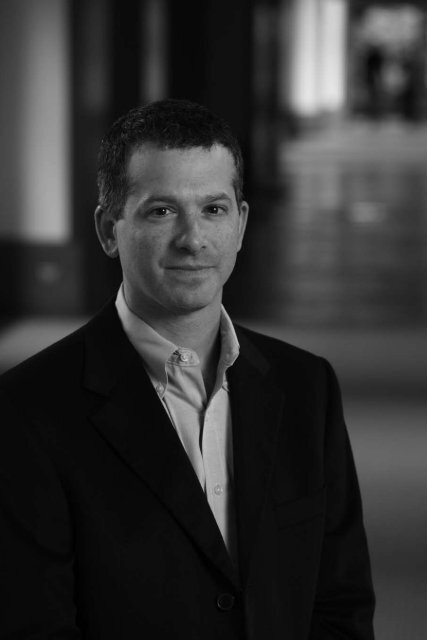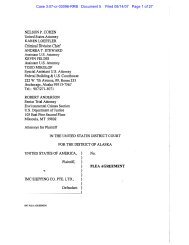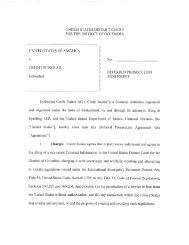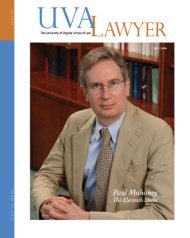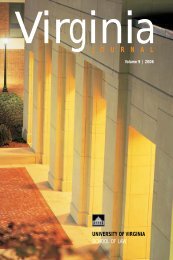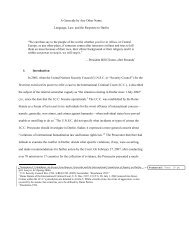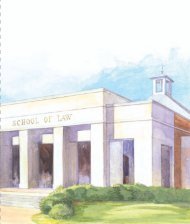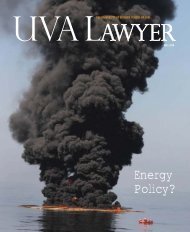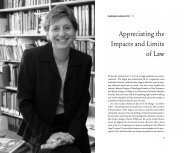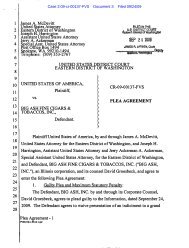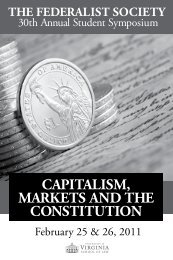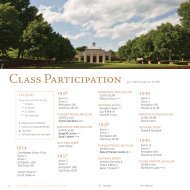Richard C. Schragger - University of Virginia School of Law
Richard C. Schragger - University of Virginia School of Law
Richard C. Schragger - University of Virginia School of Law
You also want an ePaper? Increase the reach of your titles
YUMPU automatically turns print PDFs into web optimized ePapers that Google loves.
ichard schragger<br />
Examining Cities,<br />
Constitutions, and the<br />
Connections Between Them<br />
<strong>Richard</strong> <strong>Schragger</strong>’s work ranges widely—from<br />
the nuts and bolts <strong>of</strong> municipal government to constitutional and<br />
political theory, from mayors to Supreme Court justices. That is what<br />
you might expect from someone who is interested in cities, constitutions,<br />
and their intersection. <strong>Schragger</strong>’s work is sometimes described as local<br />
government law, but that is<br />
too confining a category. He is<br />
really interested in how political “ … we miss hugely<br />
communities are created and<br />
sustained. That has led him to important insights if we<br />
write about the role <strong>of</strong> local,<br />
decentralized institutions in act like local institutions<br />
a federal democracy and the<br />
relationship between governments are at best unimportant<br />
at different scales. His work uses<br />
geography, sociology, economics, or at worst threatening.”<br />
political science, history, and<br />
legal theory to explore the<br />
concept <strong>of</strong> self-government.<br />
How did he get here? <strong>Schragger</strong> would blame it on his father and<br />
grandfather, both lawyers who worked in and with state and local<br />
<strong>University</strong> <strong>of</strong> <strong>Virginia</strong> <strong>School</strong> <strong>of</strong> <strong>Law</strong> | 53
ethinking local government<br />
governments in Trenton, New Jersey. He would also have to credit the<br />
constitutional theory courses he took as an undergraduate, and the local<br />
government law class he took at Harvard <strong>Law</strong> <strong>School</strong>. And finally, he would<br />
point to his interest in race and poverty, which has led him to ask why<br />
America has so <strong>of</strong>ten failed to build livable, just, integrated cities.<br />
His first full-length article, “The Limits <strong>of</strong> Localism,” 100 Mich.<br />
L. Rev. 371 (2001), addresses a number <strong>of</strong> these themes through an<br />
exploration <strong>of</strong> Chicago v. Morales, a Supreme Court case that struck<br />
down a city ordinance that banned loitering by gang members in certain<br />
inner-city Chicago neighborhoods. Morales engendered a continuing<br />
debate in criminal law scholarship about the devolution <strong>of</strong> constitutional<br />
law to the neighborhood level, with some scholars arguing that local<br />
communities should be able to depart from constitutional norms under<br />
certain circumstances.<br />
<strong>Schragger</strong>’s article identifies three accounts <strong>of</strong> community that<br />
provide the most common theoretical grounds for local autonomy. Then,<br />
using the insights <strong>of</strong> legal geography, the article critiques each account.<br />
<strong>Law</strong> is <strong>of</strong>ten “boundary creating,” <strong>Schragger</strong> contends, borrowing from<br />
Robert Cover—it marks us in legal, social, and literal space as insiders<br />
or outsiders, members or nonmembers, citizens or noncitizens. While<br />
boundaries create citizens (or aspire to do so), they must also, by<br />
definition, create noncitizens. They are therefore invariably destructive<br />
<strong>of</strong> the ideal <strong>of</strong> a wider community. <strong>Schragger</strong> concludes that if we want<br />
to defend particular policies, we cannot do so by invoking some noncontroversial<br />
notion <strong>of</strong> “community” or “autonomy” but must do so based<br />
on the merits <strong>of</strong> the policies themselves, that is, on substantive grounds.<br />
In the case <strong>of</strong> Morales, the invocation <strong>of</strong> “community” hid the true costs<br />
<strong>of</strong> the anti-loitering ordinance on outsiders.<br />
In “The Role <strong>of</strong> the Local in the Doctrine and Discourse <strong>of</strong> Religious<br />
Liberty,” 117 Harv. L. Rev. 1810 (2004), <strong>Schragger</strong> makes a substantive<br />
claim that points in a different direction—this time, it is in the context<br />
<strong>of</strong> church-state relations, and he argues in favor <strong>of</strong> local authority. The<br />
conventional wisdom is that local political institutions are <strong>of</strong>ten hostile<br />
54 |<br />
<strong>Virginia</strong> Journal Volume 12 | 2009
ichard schragger<br />
to religious minorities and therefore particularly in need <strong>of</strong> central oversight—judicial<br />
or otherwise. <strong>Schragger</strong> argues just the opposite.<br />
He claims that local government—and more generally the<br />
decentralization <strong>of</strong> power—is a robust structural component <strong>of</strong> religious<br />
liberty. He concludes that the chief threat to religious liberty is the<br />
exercise <strong>of</strong> centralized power generally, either to benefit religion as a class<br />
or to burden it. <strong>Schragger</strong>’s central point is that the scale <strong>of</strong> government<br />
matters when considering the substantive goals <strong>of</strong> the religion clauses.<br />
Once one pays attention to scale, it becomes clear that our fear <strong>of</strong> local<br />
government is as misplaced as our trust in centralized oversight.<br />
<strong>Schragger</strong>’s work emphasizes the role <strong>of</strong> local institutions in a system<br />
<strong>of</strong>ten presumed to have only two levels—state and federal. In this way,<br />
his scholarship is an antidote to public law’s fixation with federalism.<br />
That cities, towns, counties, and school districts are central to our<br />
lives is obvious, but the myth <strong>of</strong> a two-tiered federalism still dominates<br />
constitutional law and scholarship. In “Reclaiming the Canvassing Board:<br />
Bush v. Gore and the Political Currency <strong>of</strong> Local Government,” 50 Buffalo<br />
L. Rev. 393 (2002), <strong>Schragger</strong> shows how this constitutional blindness is<br />
built into judicial doctrine and how distrust <strong>of</strong> local institutions is built<br />
into our constitutional culture. <strong>Schragger</strong> claims that this distrust is<br />
unwarranted and in tension with our pr<strong>of</strong>essed commitment to self-rule.<br />
“I’m not a romantic about local government—it is <strong>of</strong>ten beset by serious<br />
political pathologies,” says <strong>Schragger</strong>. “But we miss hugely important<br />
insights if we act like local institutions are at best unimportant or at worst<br />
threatening.”<br />
The relative power <strong>of</strong> local institutions is the subject <strong>of</strong> two other articles,<br />
one on same-sex marriage and the other on the power <strong>of</strong> mayors in a<br />
federal system. In “Cities as Constitutional Actors: The Case <strong>of</strong> Same-Sex<br />
Marriage,” 21 Va. J.L. & Pol. 147 (2005), <strong>Schragger</strong> considers San Francisco’s<br />
recognition <strong>of</strong> gay marriage and <strong>of</strong>fers a reading <strong>of</strong> Supreme Court<br />
precedent that provides room for local governments to resist state-level<br />
commands under certain circumstances. Specifically, <strong>Schragger</strong> argues<br />
that a form <strong>of</strong> constitutional localism is currently embedded in the<br />
<strong>University</strong> <strong>of</strong> <strong>Virginia</strong> <strong>School</strong> <strong>of</strong> <strong>Law</strong> | 55
ethinking local government<br />
Court’s jurisprudence and that it can be read to protect local autonomy<br />
when cities seek to enforce certain kinds <strong>of</strong> equal treatment guarantees.<br />
This “decentralized equal protection” would provide San Francisco some<br />
constitutional traction in challenging California’s preemption <strong>of</strong> the city’s<br />
same-sex marriages.<br />
In “Can Strong Mayors Empower Weak Cities? On the Power <strong>of</strong> Local<br />
Executives in a Federal System,” 115 Yale L.J. 2542 (2006), <strong>Schragger</strong><br />
explores the relationship between the federal structure and local executive<br />
power. <strong>Schragger</strong> asks why big city mayors in the United States are<br />
relatively weak institutional actors and suggests that constitutional federalism<br />
is partly to blame. Under America’s distinctive form <strong>of</strong> federalism,<br />
cities are granted a great deal <strong>of</strong> autonomy but given little capacity to<br />
address their most intractable problems.<br />
Each <strong>of</strong> these articles ask: What are the legal and institutional<br />
capacities <strong>of</strong> local governments in a federal system? What should those<br />
capacities be? And what does (and should) the Constitution say about<br />
it? <strong>Schragger</strong> thinks this is where the action is. “Constitutional scholars<br />
have written pages and pages about ‘what is truly local and what is truly<br />
national,’ (to quote Justice Rehnquist from United States v. Morrison), but<br />
cities and other ‘truly local’ institutions are <strong>of</strong>ten invisible to mainstream<br />
public law scholarship and to our students. That is a mistake. Local<br />
government is where government policies are felt most directly, and where<br />
racial, economic, and social policy meets the road.”<br />
<strong>Schragger</strong> recognizes that the invocation <strong>of</strong> localism has <strong>of</strong>ten served<br />
to entrench and mask inequality. But he argues that decentralization<br />
can also have a powerful egalitarian and democratic valence. In “The<br />
Anti-Chain Store Movement, Localist Ideology, and the Remnants <strong>of</strong><br />
the Progressive Constitution, 1920-1940,” 90 Iowa L. Rev. 1011 (2005),<br />
<strong>Schragger</strong> explores this aspect <strong>of</strong> localism in the economic sphere. He tells<br />
the history <strong>of</strong> the popular opposition to chain stores in the United States<br />
in the 1920s and 1930s, and places this opposition in the context <strong>of</strong> the<br />
shift from Lochnerian jurisprudence to the New Deal. During that period,<br />
chain store opponents, including Justice Louis Brandeis, argued that the<br />
56 |<br />
<strong>Virginia</strong> Journal Volume 12 | 2009
ichard schragger<br />
chains were undermining the small, independent retailer and destroying<br />
America’s small towns. They argued that the concentration <strong>of</strong> economic<br />
capital in large corporate entities threatened democratic citizenship.<br />
These localist and decentralist arguments were taken seriously by state<br />
legislatures, many <strong>of</strong> which adopted anti-chain store tax laws, and by<br />
Congress, which adopted amendments to the federal antitrust laws. The<br />
Supreme Court considered a number <strong>of</strong> chain store tax cases during the<br />
late 1920s and 1930s, one <strong>of</strong> which—Liggett v. Lee—resulted in one <strong>of</strong><br />
Brandeis’s most famous dissents.<br />
In “The Anti-Chain Store Movement …”, <strong>Schragger</strong> uncovers an alternative<br />
history <strong>of</strong> progressive political and economic localism. He observes<br />
that Brandeis’s defense <strong>of</strong> the small retailer was the outgrowth <strong>of</strong> a political<br />
philosophy that emphasized both political decentralization and economic<br />
deconcentration. For Brandeis and other decentralist intellectuals <strong>of</strong> the<br />
time, the “curse <strong>of</strong> bigness” was the concentration <strong>of</strong> wealth in big corporations<br />
and the concentration <strong>of</strong> power in big government. The New Dealers<br />
made peace with both, however, and by the 1940s localist arguments<br />
became the province <strong>of</strong> states-righters and segregationists. Although this<br />
meant that Brandeis’s alternative was marginalized, <strong>Schragger</strong> believes<br />
that a form <strong>of</strong> progressive decentralization is still possible.<br />
His most recent scholarship explores this possibility, focusing on the<br />
twin themes <strong>of</strong> political and economic decentralization. In “Cities, Economic<br />
Development, and the Free Trade Constitution,” 94 Va. L. Rev.<br />
1091 (2008), <strong>Schragger</strong> argues that we have misunderstood the nature <strong>of</strong><br />
the American common market and the constitutional rules that govern<br />
that market. While constitutional doctrine focuses on inter-state trade in<br />
defining the parameters <strong>of</strong> the national free market, the bulk <strong>of</strong> internal<br />
U.S. trade takes place between cities and in and between metropolitan<br />
areas. By looking at the free trade constitution from the perspective <strong>of</strong> the<br />
city, <strong>Schragger</strong> forces us to radically rethink the constitutional doctrines<br />
that are relevant to preserving the common market. For example, local<br />
land use ordinances, which the Supreme Court rarely reviews for their<br />
protectionist effects, are central instruments in the cross-border control <strong>of</strong><br />
<strong>University</strong> <strong>of</strong> <strong>Virginia</strong> <strong>School</strong> <strong>of</strong> <strong>Law</strong> | 57
ethinking local government<br />
persons, goods, and capital. Once local governments are brought to the fore,<br />
a whole set <strong>of</strong> doctrinal inconsistencies and contradictions emerge, as well<br />
as a new understanding <strong>of</strong> the actual contours <strong>of</strong> the “free trade” constitution.<br />
That constitution looks nothing like the one that we are accustomed<br />
to seeing—the one in which states are the sole focus <strong>of</strong> attention.<br />
A forthcoming article continues with this theme. “Mobile Capital,<br />
Economic Regulation, and the Democratic City,” 123 Harv. L. Rev.—<br />
(forthcoming 2009), considers the appropriate scale for economic<br />
regulation. Despite the conventional wisdom that sub-national governments<br />
cannot effectively control or redistribute capital, <strong>Schragger</strong> observes<br />
that cities have increasingly sought to do both. His article describes these<br />
efforts, which include putting conditions on the entry <strong>of</strong> development dollars<br />
through contract, excluding capital through anti-chain and anti-big<br />
box store laws, and redistributing from capital to labor through local<br />
minimum wage laws and other labor-friendly legislation. This new “regulatory<br />
localism” is noteworthy because it challenges the proposition that<br />
industrial policy, redistribution, and other responses to global economic<br />
restructuring must be addressed at the national level. It also challenges<br />
the proposition that local economic development policies must necessarily<br />
be biased in favor <strong>of</strong> corporate capital.<br />
<strong>Schragger</strong>’s article makes us rethink a whole set <strong>of</strong> assumptions<br />
about which levels <strong>of</strong> government are equipped to handle large-scale<br />
shifts in the economy. And it further advances a claim that would have<br />
been familiar to Brandeis and the decentralist intellectuals <strong>of</strong> the Progressive<br />
Era. <strong>Schragger</strong> argues that the division <strong>of</strong> authority between cities,<br />
states, and the federal government is best understood as a reaction to<br />
the political pathologies that arise from the government-business relationship.<br />
Legal scholars who write about the division <strong>of</strong> authority among levels<br />
<strong>of</strong> government <strong>of</strong>ten miss this central insight. When lawyers debate the<br />
vertical distribution <strong>of</strong> powers, they <strong>of</strong>ten do not see that distribution as<br />
a proxy for regulating the relationship between private capital and public<br />
power. <strong>Schragger</strong> argues, however, that the question <strong>of</strong> how power is allocated<br />
among levels <strong>of</strong> government is secondary to the question <strong>of</strong> how<br />
58 |<br />
<strong>Virginia</strong> Journal Volume 12 | 2009
ichard schragger<br />
government power is allocated vis-à-vis capital—in particular, vis-à-vis<br />
large-scale, mobile capital.<br />
The relationship between public and private power, between democracy<br />
and capital, looms large for <strong>Schragger</strong>. He argues that we cannot<br />
understand our constitutional culture without understanding how the<br />
market economy shapes political institutions and vice versa. An effort<br />
along these lines is <strong>Schragger</strong>’s most recent article, entitled “Rethinking<br />
the Theory and Practice <strong>of</strong> Local Economic Development,” 77 Chi. L.<br />
Rev.—(forthcoming 2010). There, <strong>Schragger</strong> argues that scholars’ policy<br />
prescriptions have to be based in a realistic account <strong>of</strong> how city economies<br />
form, grow, prosper, and decline. Much <strong>of</strong> the economic theory<br />
that informs local government law scholarship is too simplistic, he contends,<br />
because it assumes a competitive model <strong>of</strong> economic development.<br />
<strong>Schragger</strong> urges scholars to think harder about how cities work and what<br />
institutional arrangements might make them work better in a market<br />
economy in which private enterprise is the main driver <strong>of</strong> prosperity.<br />
Thinking hard about the role <strong>of</strong> local institutions in our constitutional<br />
and economic order has been <strong>Schragger</strong>’s scholarly preoccupation.<br />
“We can learn so much simply by shifting scales,” <strong>Schragger</strong> observes.<br />
“Legal doctrine has to be made with attention to its actual operation on<br />
the ground, in the places that we live, in the communities that we build.”<br />
<strong>Schragger</strong> has staked out a scholarly agenda that takes localism seriously<br />
and that challenges the conventional wisdom about the limitations and<br />
possibilities <strong>of</strong> local self-government. “In the 1960s and 1970s there was<br />
a real scholarly effort—in law schools and out—to think about how we<br />
construct and think about cities, the people who live in them, and their<br />
welfare. Those issues are again on the table. Young local government law<br />
scholars are generating new ideas in the field. And we are seeing more<br />
nuanced accounts <strong>of</strong> how democracy and economy operate across local,<br />
state, and national scales.” For a scholar <strong>of</strong> cities and constitutions, especially<br />
one with <strong>Schragger</strong>’s vision and energy, it is an exciting time. <br />
<strong>University</strong> <strong>of</strong> <strong>Virginia</strong> <strong>School</strong> <strong>of</strong> <strong>Law</strong> | 59
Excerpts<br />
The Role <strong>of</strong> the Local in the Doctrine and<br />
Discourse <strong>of</strong> Religious Liberty<br />
117 Harv. L. Rev. 1810 (2004)<br />
The antimajoritarian character <strong>of</strong> the Religion Clauses<br />
is their most salient feature. America’s extraordinary religious pluralism,<br />
scholars <strong>of</strong>ten argue, is the direct result <strong>of</strong> a system <strong>of</strong> religious freedom<br />
that at the very least prevents majorities from imposing norms <strong>of</strong> religious<br />
exercise on minorities. What has been somewhat surprising is scholars’<br />
and courts’ inattention to the location and institutional character <strong>of</strong> these<br />
majorities. At the Founding, the Religion Clauses limited the power <strong>of</strong> the<br />
federal government to enact a national religion—“Congress shall make no<br />
law,” reads the First Amendment. Until the advent <strong>of</strong> the Supreme Court’s<br />
modern Religion Clause jurisprudence, with the application <strong>of</strong> the First<br />
Amendment to the states in the 1940s, states were free to regulate religion<br />
and religious exercise, limited only by their own constitutional provisions.<br />
Since incorporation, however, much <strong>of</strong> Religion Clause doctrine has been<br />
preoccupied with neither federal nor state governments, but rather with<br />
local ones: city councils that adopt Sunday closing laws or sponsor religious<br />
displays in front <strong>of</strong> city hall; school boards that provide busing or equipment<br />
to students in religious schools, that restrict access by religious groups to<br />
school property, or that permit a prayer at a graduation ceremony; zoning<br />
boards that deny a church’s permit to expand or that allow churches an<br />
exemption from applicable local land-use ordinances.<br />
In short, modern Religion Clause jurisprudence has been to a significant<br />
degree a product <strong>of</strong> religious conflicts within smaller polities—a<br />
jurisprudence (putting it more prosaically) <strong>of</strong> municipal regulation.<br />
60 |<br />
<strong>Virginia</strong> Journal Volume 12 | 2009
Because the post-incorporation Court has never made a distinction<br />
among levels <strong>of</strong> government—local, state, or federal—when considering<br />
Establishment or Free Exercise Clause challenges, constitutional theorists<br />
have rarely treated this locational fact as significant. This Article<br />
seeks to remedy that oversight. In exploring the implications <strong>of</strong> a constitutional<br />
commitment to religious freedom in a nation <strong>of</strong> towns, it argues<br />
that the predominantly local character <strong>of</strong> Religion Clause disputes should<br />
have theoretical and doctrinal significance. It seeks to conceptualize the<br />
role <strong>of</strong> the local in the doctrine and discourse <strong>of</strong> religious liberty.<br />
The fact that much <strong>of</strong> Religion Clause doctrine has been forged in<br />
conflicts that directly implicate the traditional powers <strong>of</strong> local government<br />
is not surprising. Individuals and communities <strong>of</strong> individuals tend<br />
to wrestle with the relationship between church and state at close quarters.<br />
In one case, a small Texas town wants to come together and pray<br />
at community civic events, like a football game. In another case, a city<br />
seeks to display a religious symbol in front <strong>of</strong> the town hall. These efforts<br />
concern, at least for the combatants, the moral virtue—even the salvation—<strong>of</strong><br />
a particular community. At stake is the soul <strong>of</strong> a specific place.<br />
Witness the Florida town that declared by mayoral proclamation that<br />
Satan was banned from the city limits. Like mayors placing the Ten Commandments<br />
at the doorsteps <strong>of</strong> city hall, the town leaders placed markers<br />
containing the declaration at the entry points to the city. These and other<br />
attempts at creating communities <strong>of</strong> virtue are not ambitious; they stop<br />
at the city limits. Participants assert a modest agenda, to do “what [is]<br />
best for [our] town.”<br />
In the past, such ambitions <strong>of</strong>ten partook <strong>of</strong> territorial claims. And<br />
though religion no longer “runs with the land” as it did when explorers<br />
would claim aboriginal lands for crown and church (thus subsuming the<br />
inhabitants under both), we have not been able to banish territoriality<br />
entirely. As historian Martin Marty has observed, the religious history<br />
<strong>of</strong> the United States must be understood in the context <strong>of</strong> place and<br />
space—as the negotiation and competition between the state and religion<br />
(and among religions) for territory, both in the sense <strong>of</strong> defensible georichard<br />
schragger<br />
<strong>University</strong> <strong>of</strong> <strong>Virginia</strong> <strong>School</strong> <strong>of</strong> <strong>Law</strong> | 61
excerpts<br />
graphic boundaries and defensible social and cultural room to maneuver.<br />
Implicit in this observation is that the American experiment in pluralism<br />
is only truly tested under conditions <strong>of</strong> urbanity. The frontier permitted<br />
escape from intolerance, a space for religious exercise that would otherwise<br />
be anathema to one’s neighbors. The Mormons made free exercise by<br />
migrating to a place where no one else was (though ultimately it failed to<br />
protect them). In contrast, the ghetto provides sanctuary when there is<br />
no open expanse available for migration. It also seriously circumscribes<br />
liberty by physically defining the limits <strong>of</strong> toleration.<br />
The modern principle <strong>of</strong> religious tolerance rejects the frontier and<br />
the ghetto. That is to say that American-style religious pluralism is not<br />
based on grants <strong>of</strong> territorial autonomy to religious groups, but is instead<br />
premised on accommodating religious belief and exercise right here in<br />
our midst. It is this “in our midst” quality <strong>of</strong> religious liberty that has<br />
troubled the Court in its attempts to reconcile the competing values <strong>of</strong><br />
assimilation and autonomy, inclusion and exit, neutrality and separatism.<br />
The difficulty is that “in our midst” also means “in our backyard.” The<br />
Religion Clauses are cosmopolitan but, as James Wilson declares, “people<br />
are by nature locals.”<br />
What is the role <strong>of</strong> the local in the doctrine and discourse <strong>of</strong> religious<br />
liberty? The usual parochialism story is that local political institutions<br />
are <strong>of</strong>ten hostile to religious minorities and therefore particularly in need<br />
<strong>of</strong> central oversight—judicial or otherwise. This Article questions this<br />
conventional wisdom. It argues that local government—and more generally<br />
the decentralization <strong>of</strong> power—is a robust structural component <strong>of</strong><br />
religious liberty. First, the dispersal <strong>of</strong> political authority prevents the<br />
amassing <strong>of</strong> power to benefit or burden religion in any one institution,<br />
thus guarding against governmental overreaching. Second, the dispersal<br />
<strong>of</strong> political authority gives local governments the ability to serve as<br />
counterweights to private religious power, thus preventing religious overreaching.<br />
The first claim is based on the Madisonian view that religious faction<br />
is a particularly virulent form <strong>of</strong> faction. Disestablishment has <strong>of</strong>ten<br />
62 |<br />
<strong>Virginia</strong> Journal Volume 12 | 2009
ichard schragger<br />
been understood as the primary mechanism for ensuring that no one<br />
religious faction can gain undue power in the whole. Underappreciated<br />
by most scholars and theorists, however, is the protective role played by<br />
the dispersal <strong>of</strong> political authority. Political decentralization ensures that<br />
the national councils do not have a monopoly on the power to regulate<br />
religion. And the fragmentation <strong>of</strong> government authority encourages the<br />
formation <strong>of</strong> religious groups, a necessary precondition for the robust<br />
competition among sects that prevents any one sect from gaining political<br />
dominance in the whole. The chief threat to religious liberty, I contend,<br />
is the exercise <strong>of</strong> centralized power generally, either to benefit religion as<br />
a class or to burden it. The Court’s Religion Clause jurisprudence should<br />
therefore be more skeptical <strong>of</strong> federal and state regulations that touch on<br />
religion than <strong>of</strong> similar local regulations.<br />
The second claim—that the dispersal <strong>of</strong> authority gives local governments<br />
the ability to serve as counterweights to private religious<br />
power—suggests a role for the local that is currently at odds with an<br />
individual-rights-based approach to religious liberty. Instead <strong>of</strong> treating<br />
government as monolithic and religious rights as invariant—to be defined<br />
in the first instance by the judiciary—the decentralization approach<br />
views local governments as valuable sites <strong>of</strong> civic association with a role in<br />
articulating local constitutional norms. Indeed, by paying close attention<br />
to where most conflicts over religious liberty take place, we can excavate<br />
the nature <strong>of</strong> the relationship between city and church, community and<br />
faith, civic commitments and religious ones. The interplay <strong>of</strong> religious<br />
and civil authority and the accommodation <strong>of</strong> each occurs locally, among<br />
neighbors, in communities. Judicial or legislative actions that bypass local<br />
institutions have the effect <strong>of</strong> undermining an important institutional location<br />
for the articulation <strong>of</strong> public norms and values. This devaluation <strong>of</strong><br />
the local is dangerous because it enhances private power to the detriment<br />
<strong>of</strong> public power; it degrades the local community as a civic counterweight<br />
to religious power. On this argument, local governments are appropriate<br />
sites—not the only sites, certainly, but central and overlooked sites—for<br />
the negotiation <strong>of</strong> church-state relations. <br />
<strong>University</strong> <strong>of</strong> <strong>Virginia</strong> <strong>School</strong> <strong>of</strong> <strong>Law</strong> | 63
excerpts<br />
Mobile Capital, Local Economic Regulation,<br />
and the Democratic City<br />
123 Harv. L. Rev. —(forthcoming 2009)<br />
Economic localization is being driven by a decentralized<br />
labor movement, urban anti-poverty organizations, opportunities<br />
in municipal law, political alliances with progressive city mayors, a<br />
localist economic ideology, and the urban resurgence. These efforts are<br />
emphatically post-industrial; in this atmosphere it may be possible for<br />
cities to regulate in ways that nations and states cannot—to leverage<br />
place-dependent value and constrain or redistribute capital. This nascent<br />
localization <strong>of</strong> economic policy coincides with the rise <strong>of</strong> the region as an<br />
important economic unit and the relative decline <strong>of</strong> the nation-state as a<br />
central regulator <strong>of</strong> economic life. Even if there was the political will to<br />
generate a new relationship between capital and democracy, it is far from<br />
clear that the nation can or is in a better position than cities to deliver.<br />
Indeed, a progressive economic localism is one possible answer to the<br />
dislocations that accompany globalization.<br />
In light <strong>of</strong> these phenomena, we need to reframe our approach to city<br />
power. The conventional approach to the allocation <strong>of</strong> powers between<br />
the federal, state, and local governments involves assessing those governments’<br />
relative competences and the political effects <strong>of</strong> particular<br />
allocations. These debates occur, however, with little consideration <strong>of</strong> the<br />
allocation <strong>of</strong> power as between government and capital. Debates about<br />
decentralization make little sense without reference to the private-side<br />
exercise <strong>of</strong> economic power as well as the public-side exercise <strong>of</strong> regulatory<br />
power. The relevant question is: How is the city’s power exercised<br />
vis-à-vis capital—in particular, vis-à-vis large-scale, mobile capital? That<br />
question should inform how we conceive <strong>of</strong> local power and how we think<br />
about local economic policy.<br />
We should start by complicating our understanding <strong>of</strong> the relative<br />
64 |<br />
<strong>Virginia</strong> Journal Volume 12 | 2009
ichard schragger<br />
vulnerabilities <strong>of</strong> city and capital. The disciplining view <strong>of</strong> capital mobility<br />
is skeptical <strong>of</strong> the exercise <strong>of</strong> local power—it assumes that government<br />
power will <strong>of</strong>ten be deployed to exploit unless there are some constraints.<br />
Liberty, on this account, is the exercise <strong>of</strong> rights against—and the<br />
operation <strong>of</strong> markets free from—direct government intervention or interference.<br />
One implication <strong>of</strong> this view is that where exit does not provide<br />
sufficient discipline, legal limits on city power are appropriate to prevent<br />
exploitation <strong>of</strong> property owners, corruption, and other political process<br />
flaws <strong>of</strong> local urban democracy. Courts and legislatures should step in to<br />
prevent local oppression <strong>of</strong> the vulnerable; local authority is thus<br />
appropriately limited.<br />
When one turns away from the dominant conception <strong>of</strong> rights and<br />
markets, however, a different idea <strong>of</strong> vulnerability emerges. A competing<br />
political tradition tells us that governments are also vulnerable to markets,<br />
though this vulnerability tends to be less visible. Indeed, the vulnerability<br />
<strong>of</strong> the city to mobile capital is <strong>of</strong>ten interpreted as the reverse—the vulnerability<br />
<strong>of</strong> capital to local government.<br />
Kelo [v. New London] is a nice example: mobile capital dictates the<br />
terms <strong>of</strong> New London’s economic strategy, but the salient and legally-cognizable<br />
act was the government’s invasion <strong>of</strong> the homeowners’ property<br />
rights. The liberal economic order has the necessary tools to prevent the<br />
public sphere from invading a protected private sphere—the language <strong>of</strong><br />
rights does most <strong>of</strong> this work. But we have more trouble understanding<br />
when the private sphere is invading the sphere <strong>of</strong> the public—that is, we<br />
have more trouble preventing the distortion <strong>of</strong> public decision-making for<br />
private ends. Explicit corruption or capture <strong>of</strong> public processes can be<br />
guarded against, but the form <strong>of</strong> corruption that worries those concerned<br />
with capital’s political power—the narrowing <strong>of</strong> the public sphere, the loss<br />
<strong>of</strong> political and economic independence, government policy driven by unaccountable<br />
and unelected economic actors—is more difficult to articulate.<br />
The sense that government has lost the power to control the chief determinants<br />
<strong>of</strong> citizens’ well-being—sometimes described in terms <strong>of</strong> “democracy<br />
deficits”—drives local economic reform efforts like the minimum wage …<br />
<strong>University</strong> <strong>of</strong> <strong>Virginia</strong> <strong>School</strong> <strong>of</strong> <strong>Law</strong> | 65
excerpts<br />
Our difficulty in articulating this concern reflects the pervasiveness<br />
<strong>of</strong> the negative conception <strong>of</strong> rights as trumps to be asserted against government<br />
invasions. That difficulty also stems from the fact that we have<br />
come to discount the notion <strong>of</strong> the common good itself; the “public” no<br />
longer exists, but is an amalgam <strong>of</strong> private interests. Indeed, our current<br />
theories <strong>of</strong> democratic process—dominated as they are by public choice—<br />
tend to undermine the idea <strong>of</strong> an identifiable democratic public at all. The<br />
democratic public either does not exist or has no interests that can be<br />
invaded by private-side rights-bearers.<br />
But this one-sidedness masks the central problem, which is that<br />
the political pathologies <strong>of</strong> local government are, in significant part, a<br />
function <strong>of</strong> local government’s relationship to capital. Indeed, both concerns—the<br />
public invasion <strong>of</strong> rights and the private corruption <strong>of</strong> the<br />
public good—have and continue to be dominant problems in the citybusiness<br />
relationship. Recall that the original 19th century limitations<br />
on city power were a means <strong>of</strong> restraining giveaways to mobile capital;<br />
the counter-movement to limit state authority was motivated by similar<br />
concerns that business-dominated interests were corrupting good municipal<br />
government. Limiting municipal power to intervene in the private<br />
marketplace by enforcing a rigid public/private distinction and adjusting<br />
the city’s powers vis-à-vis higher level governments have been the two<br />
primary ways <strong>of</strong> dealing with the pathologies <strong>of</strong> the city-business relationship.<br />
These conceptual narratives continue to dominate the current law<br />
<strong>of</strong> local government.<br />
Those efforts are quite imperfect, however. More importantly, they<br />
appear unable to effectively cabin the politics <strong>of</strong> capital attraction, retention,<br />
and exploitation. That is because the relationship between the legal<br />
regulation <strong>of</strong> the city and mobile capital is not a linear one. The city<br />
develops in tandem with private investment, commercial activity, and<br />
capital formation—city power cannot be disentangled from the power<br />
<strong>of</strong> private economic activity. Mobile capital operates through the instruments<br />
<strong>of</strong> local government; the rules that bind the latter might well be<br />
for the purpose <strong>of</strong> binding the former. Reformers legitimately worry that<br />
66 |<br />
<strong>Virginia</strong> Journal Volume 12 | 2009
ichard schragger<br />
public power will be used as an instrument for private gain, but private<br />
gain is the city’s lifeblood.<br />
The notion <strong>of</strong> city power is thus more complicated than it appears.<br />
Cataloguing the powers or limitations <strong>of</strong> municipal government does not<br />
tell us very much. Rather, one needs to ask how lodging authority to make<br />
certain kinds <strong>of</strong> decisions at a particular level <strong>of</strong> government—federal,<br />
state, or local—affects the city-business relationship. Indeed, the city<br />
power debate—to the extent it only looks at the legal powers <strong>of</strong> cities<br />
vis-à-vis other levels <strong>of</strong> government—is somewhat beside the point. Local<br />
“autonomy” is not an available option: first, because the city and private<br />
investment are inextricably linked; and second, because different allocations<br />
<strong>of</strong> legal authority as between the city, state, and federal governments<br />
will have different (and not always predictable) consequences for the city’s<br />
vulnerability to private-side control and manipulation. <br />
<strong>University</strong> <strong>of</strong> <strong>Virginia</strong> <strong>School</strong> <strong>of</strong> <strong>Law</strong> | 67
schragger Bibliography<br />
Publications<br />
“The Last Progressive: Justice Breyer, Heller, and ‘Judicial Judgement’” 59<br />
Syracuse L. Rev. 283 (2008) (Symposium: District <strong>of</strong> Columbia v. Heller)<br />
“Cities, Economic Development, and the Free Trade Constitution,” 94 Va. L.<br />
Rev. 1091 (2008)<br />
“San Antonio v. Rodriguez and the Legal Geography <strong>of</strong> <strong>School</strong> Finance<br />
Reform” in Golub<strong>of</strong>f and Gilles, eds., Civil Rights Stories (2007)<br />
“Can Strong Mayors Empower Weak Cities? On the Power <strong>of</strong> Local Executives<br />
in a Federal System,” 115 Yale L.J. 2542 (2006)<br />
“Cities As Constitutional Actors: The Case <strong>of</strong> Same-Sex Marriage,” 21 Va.<br />
J.L. & Pol. 147 (2005) (Symposium: Democracy in Action? The <strong>Law</strong> and<br />
Politics <strong>of</strong> Local Governance).<br />
“The Anti-Chain Store Movement, Localist Ideology, and the Remnants <strong>of</strong> the<br />
Progressive Constitution, 1920–1940,” 90 Iowa L. Rev. 1011 (2005)<br />
“The Role <strong>of</strong> the Local in the Doctrine and Discourse <strong>of</strong> Religious Liberty,”<br />
117 Harv. L. Rev. 1810 (2004)<br />
“Consuming Government” (reviewing William Fischel, The Homevoter<br />
Hypothesis:How Home Values Influence Local Government Taxation,<br />
<strong>School</strong> Finance, and Land-Use Policies (2001)), 101 Mich. L. Rev. 1824<br />
(2003), excerpted in Frug, Ford & Barron, Local Government <strong>Law</strong> (4th<br />
ed. 2006) at 491<br />
“Reclaiming the Canvassing Board: Bush v. Gore and the Political Currency <strong>of</strong><br />
Local Government,” 50 Buffalo L. Rev. 393 (2002)<br />
“The Limits <strong>of</strong> Localism,” 100 Mich. L. Rev. 371 (2001)<br />
Note, “The Faith to Change: Reconciling the Oath to Uphold with the Power<br />
to Amend,” 109 Harv. L. Rev. 1747 (1996)<br />
Other Publications<br />
“The Progressive City” in “Why the Local Still Matters: Federalism, Localism,<br />
and Public Interest Advocacy,” Papers from the Eleventh Annual Liman<br />
Public Interest Program Colloquium (2009)<br />
68 |<br />
<strong>Virginia</strong> Journal Volume 12 | 2009
ichard schragger<br />
“Congress Behaving Badly” (with Dahlia Lithwick), Washington Post, Oct. 8,<br />
2006<br />
“Cooler Heads: The Difference Between the President’s <strong>Law</strong>yers and the<br />
Military’s,” Slate, Sept. 20, 2006<br />
City Powers Project: Denver, Colorado (2005) (commissioned as a report to<br />
the Boston Foundation)<br />
“Rock and Roe: Alito’s Unequivocal Abortion Decisions,” Slate, Nov. 1, 2005.<br />
“Commentary: The Real World/Why Judicial Philosophies Matter” (with R.<br />
Golub<strong>of</strong>f), Slate, Sept. 7, 2005<br />
“At Risk: Roe, Rights and Religion,” Los Angeles Times, July 21, 2005. Articles<br />
works in progress<br />
“Rethinking the Theory and Practice <strong>of</strong> Local Economic Development,”<br />
Chicago L. Rev. (forthcoming 2010)<br />
“Mobile Capital, Local Economic Regulation, and the Democratic City,” 123<br />
Harv. L. Rev. (forthcoming 2009)<br />
<strong>University</strong> <strong>of</strong> <strong>Virginia</strong> <strong>School</strong> <strong>of</strong> <strong>Law</strong> | 69


